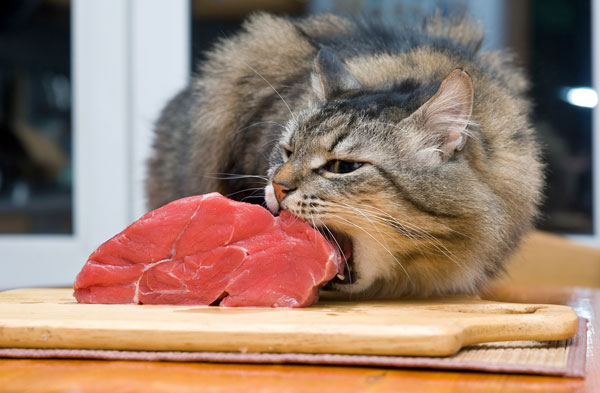On Animals, Part III: A Conversation with Barbara J. King and Jessica Pierce

Today, we’re pleased to run the final installment of a conversation between Barbara J. King and Jessica Pierce, two of our most established experts on animal-human behavior. You can read Part I and Part II of their dialogue, on questions about animal confinement, evolution, and appropriate companionship, here and here. Below, they take on a particularly ethical dilemma: in light of evolution and morality, what should we and our animal companions eat for dinner?
PIERCE: Now, two questions for you:
1. Should we also “honor the evolutionary path” of humans, when it comes to food? And what exactly would this mean? Perhaps I am hypocritical: I honor the “natural” diet of my cat, but I don’t buy into arguments that there is some “natural” way of eating for humankind (and I am particularly skeptical of arguments that meat-eating is “natural” and therefore justified).
2. Which animals can we eat without too heavy a moral cost? Are there some?
KING: My cats are relieved that their species now joins dogs on the conditionally acceptable list! Seriously though, thanks for a good back-and-forth on that issue. As to your evolutionary question, I think there’s a distinction—a difference that makes a difference, if you will—between cats’ and humans’ evolutionary trajectories when it comes to food. As far as I know, cats have always been carnivores, and that won’t be changing anytime soon. The evolutionary trajectory of humans is more complicated. For one thing, we’re omnivores. This means that the contribution of meat to the diet of contemporary populations varies greatly and indeed the same was true for ancestral populations in prehistory. As a species, there’s no question that meat-eating played a role in our evolution, yet at the same time, we are flexible and facultative when it comes to what we eat, and we can stay healthy on many different kinds of diets. There isn’t, then, a single right or natural way to eat—which, when I’ve written in my blogging for NPR, outrages the more fierce advocates of the Paleo diet!
Even more important, to my mind, is the fact that our evolution is not only about our teeth and our guts, but also about our cognition, our emotional connection to other life around us, and our sense of ethics. Unlike cats, we can think critically, as you do all the time, Jessica, about our responsibility towards other creatures. Global inequities and global hunger mean that of course millions of people eat meat because other animals are a key protein source for them. For anyone across the world fortunate enough to have economic choices in the matter, “honoring our evolutionary path” could well, in my view, embrace vegetarianism or veganism.
I’m just now grabbing serious hold of the question of what animals we can eat without too heavy a moral cost? The way I’m approaching my next book is not to provide an across-the-board answer to that, because I’m uninterested in proscribing what people should or shouldn’t eat—that’s not my approach at all. At the moment, I’m myself a pescatarian, and I’m grappling with what that means and whether I want to continue to eat fish and if so, which fish. Instead I’m interested in writing, in what I hope are fresh ways about animals lots of people do eat—ranging from octopus to chickensand even to insects. I’ve become keenly intrigued by entomophagy, even experimenting just a bit with insect-eating, in order to think about what it may mean into the future for issues of global hunger and animal welfare.
In a way, we’re back where we started. It’s clear to me that you feel, too, a constant engagement in your own life with the issues you write about, yes?
PIERCE: Yes, and I suppose that I why I both love and sometimes hate my chosen career: the constant sense of engagement. Why I love it is obvious—it makes life, and work, a seamless web, and it keeps life interesting. Still, it feels as if I can never escape the moral questions, and can never reach a point of complete comfort with some of the most important choices I make from day to day: sharing my life with non-human animals and deciding what to eat.
To read more about the work of King and Pierce, click here and here.